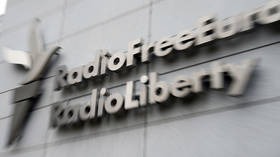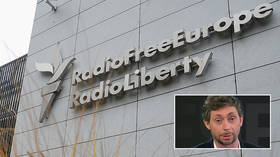US state-run media RFE/RL fined $150,000 by Russia for failing to declare as 'foreign agent', says will appeal ‘unfair’ judgements

US state-run broadcaster RFE/RL has been fined 11 million rubles ($150,000) by a Russian court after failing to declare on its network of websites that they are registered as “foreign agents” – a requirement by law.
According to Roskomnadzor, Russia’s media regulator, there have been 166 instances of the broadcaster’s non-compliance with the requirement to declare foreign agent status. Thus far, courts have considered 40 of them and have ruled against RFE/RL in every single case.
Along with other American government-run outlets such as Voice of America and Current Time, RFE/RL was declared a foreign agent in 2017, a month after Russian President Vladimir Putin signed a law enabling authorities to list foreign media as ‘foreign agents’. Notably, the move came shortly after Washington designated Russian outlets RT and Sputnik as ‘foreign agents’ in the US.
Also on rt.com Opposition hopes that Yulia Navalnaya could be Russia’s Svetlana Tikhanovskaya may be dashed by new ‘foreign agent’ legislationAfter the US-based organization was given foreign agent status, RFE/RL created a Russian legal entity, which was later also recognized as a foreign agent under new legislation.
In response to the fines, RFE/RL says it plans to appeal.
“We have court hearings about three times a week, and we get fined at each one,” Andrei Shary, head of RFE/RL’s Russian-language Service, told Moscow’s TASS news agency on Wednesday.
“The company considers this to be unfair. Every court decision will be appealed. We filed our first appeal on Friday and we are filing the second one today.”
According to RIA, citing Roskomnadzor’s press service, RFE/RL has thus far failed to pay fines for not having the appropriate labeling, and measures will be taken until the legal requirement is implemented.
In December last year, Russian lawmakers approved new legislation to expand foreign agent laws, meaning that ordinary citizens can be given the designation if they are involved in political activity and receive funding from abroad. In recent days, there have been proposals to broaden the legislation even further, with a group of businessmen asking the government to ban foreign agents and their close relatives from running in elections.
In March, Putin claimed that the ruling doesn’t prohibit the work of designated organizations but “exists simply to protect Russia from external meddling in its politics.”
Like this story? Share it with a friend!














